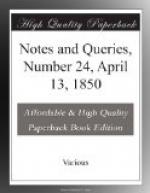Spurious Letter of Sir R. Walpole (No. 19. p. 304.)—“P.C.S.S.” (No. 20. p. 321.) and “LORD BRAYBROOKE” (No. 21. p. 336.) will find their opinion of the letter being spurious confirmed by the appendix to Lord Hervey’s Memoirs, (vol. ii. p. 582.), and the editor’s note, which proves the inaccuracy of the circumstances on which the inventor of the letter founded his fabrication. In addition to Lord Braybrooke’s proofs that Sir Robert was not disabled by the stone, for some days previous to the 24th, from waiting on the king, let me add also, from Horace Walpole’s authority, two conclusive facts; the first is, that it was not till Sunday night, the 31st January (a week after the date of the letter) that Sir Robert made up his mind to resign; and, secondly, that he had at least two personal interviews with the king on that subject.
C.
Line quoted by De Quincey.—“S.P.S.” (No. 22. p. 351.) is informed that
“With battlements that on their
restless fronts
Bore stars"...
is a passage taken from a gorgeous description of “Cloudland” by Wordsworth, which occurs near the end of the second book of the Excursion. The opium-eater gives a long extract, as “S.P.S.” probably remembers.
A.G.
Ecclesfield, March 31. 1850.
Quem Jupiter vult perdere prius dementat.—Malone, in a note in Boswell’s Johnson (p. 718., Croker’s last edition), says, that a gentleman of Cambridge found this apophthegm in an edition of Euripides (not named) as a translation of an iambic.
“[Greek: On Theos Delei hapolesai, pr_ot’ hapophrenoi.]”
The Latin translation the Cambridge gentleman might have found in Barnes; but where is the Greek, so different from that of Barnes, to be found? It is much nearer to the Latin.
C.
Bernicia.—In answer to the inquiry of “GOMER” (No. 21. p. 335.), “P.C.S.S.” begs leave to refer him to Camden’s Britannia (Philemon Holland’s translation, Lond. fol. 1637), where he will find, at p. 797., the following passage:—
“But these ancient names were quite worn out of use in the English Saxon War; and all the countries lying north or the other side of the arme of the sea called Humber, began, by a Saxon name, to be called [Old English: Northan-Humbra-ric] that is, the Kingdome of Northumberland; which name, notwithstanding being now cleane gone in the rest of the shires, remayneth still, as it were, surviving in Northumberland onely; which, when that state of kingdome stood, was known to be a part of the Kingdome of Bernicia, which had peculiar petty kings, and reached from the River Tees to Edenborough Frith.”
At p. 817. Camden traces the etymology of Berwick from Bernicia.
P.C.S.S.




